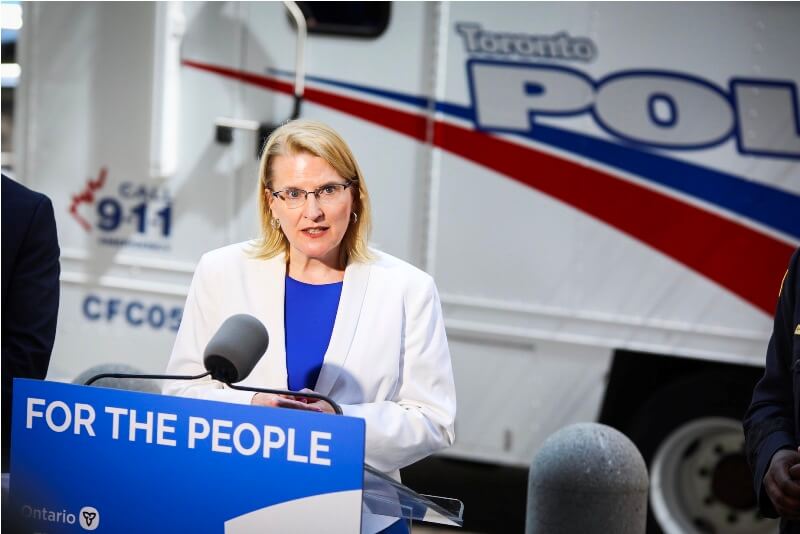
Ontario Introduces New Anti-Human Trafficking Legislation
Proposed Changes Will Better Protect Victims, Support Survivors and Increase Tools to Crack Down on Offenders
The Voice of Canada News-
National Human Trafficking Awareness Day, the Ontario government introduced the Combatting Human Trafficking Act, new legislation and amendments to existing legislation to build upon the province’s $307 million Anti-Human Trafficking Strategy. This proposed legislation reinforces Ontario’s commitment to fighting human trafficking and demonstrates continued leadership in responding to this pervasive crime.
“Our government is taking deliberate steps to put an end to human trafficking and protect victims and potential victims of this terrible crime,” said Premier Doug Ford. “This tough new legislation builds on our Anti-Human Trafficking Strategy we introduced nearly a year ago, giving law enforcement additional tools to help prevent and deter human trafficking.”

The proposed changes include two new acts – the Anti-Human Trafficking Strategy Act, 2021 and the Accommodation Sector Registration of Guests Act, 2021 – as well as amendments to the Child, Youth and Family Services Act, 2017 and the Prevention of and Remedies for Human Trafficking Act, 2017. Together, the proposed changes would support the government’s response to human trafficking by:
- Supporting a long-term provincial response to human trafficking and emphasizing that all Ontarians have a role to play in combatting human trafficking;
- Strengthening the ability of children’s aid societies and law enforcement to protect exploited children;
- Supporting more survivors and the people who support them in obtaining restraining orders against traffickers, with specific consideration for Indigenous survivors;
- Increasing the government’s ability to collect non-personal data to better understand the impact of the strategy and respond to human trafficking;
- Providing law enforcement with more tools to locate victims and charge traffickers by:
- Increasing penalties for traffickers who interfere with a child in the care of a children’s aid society;
- Clarifying how and when police services can access information from hotel guest registries to help deter trafficking and identify and locate victims, while establishing regulation making authority to include other types of accommodation providers.
- Requiring companies that advertise sexual services to have a dedicated contact to support investigations into suspected human trafficking.

“Our government voiced its commitment to tackling human trafficking early on in our mandate and we worked with a wide spectrum of stakeholders to establish a comprehensive $307 million Anti-Human Trafficking Strategy,” said Solicitor General Sylvia Jones. “These legislative changes, if passed, will reinforce the strategy’s key objectives of supporting survivors, protecting children and youth, raising awareness among parents and community partners as well as dismantling criminal networks.”
“Human trafficking is happening in both urban centres and small communities across Ontario,” said Jill Dunlop, Associate Minister of Children and Women’s Issues. “This proposed legislation further supports our cross-government approach, as well as our work with partners across jurisdictions and various sectors, to combat human trafficking. This includes providing tools to improve the ability to identify and appropriately respond to suspected instances and connect survivors to supportive services.”
“Our government continues to support the work of police and prosecutors to target the criminal networks that prey on and profit from young and vulnerable people in our communities,” said Attorney General Doug Downey. “We are proposing legislative reforms to better protect victims and support them in their efforts to obtain restraining orders against traffickers.”
“Fighting human trafficking takes cooperation and collaboration across sectors,” said Lisa MacLeod, Minister of Heritage, Sport, Tourism and Culture Industries. “To support the Anti-Human Trafficking Strategy, we are working with accommodation and hospitality stakeholders on measures to tackle this brazen crime head-on. If passed, the Accommodation Sector Registration of Guests Act, 2021 would deter human trafficking in hotels, motels and resorts by enhancing awareness of human trafficking, and supporting police investigations and enforcement.”

Quick Facts
- Human trafficking is one of the fastest-growing crimes worldwide. Ontario is a hub for human trafficking, with the most police-reported incidents of human trafficking in the country occurring within the province in 2019, accounting for approximately 55 per cent of all police-reported incidents of human trafficking nationally.
- The average age of recruitment into sex trafficking is approximately 13 years old.
- Over 70 per cent of human trafficking victims identified by police are under the age of 25.
Quotes
“Human trafficking is a heinous crime and a massive and growing threat to community safety across our province and Canada. This legislative effort to strengthen public awareness of human trafficking and protect and deliver justice to human trafficking victims and survivors is welcome and needs to be supported.”– Chief Antje McNeely
President of the Ontario Association of Chiefs of Police

“The Ontario Association of Children’s Aid Societies (OACAS) commends the government’s collaborative efforts to engage child welfare professionals and care providers to strengthen anti-human trafficking community supports in Ontario. This legislation is a step forward for raising awareness, and it is a critical piece to a comprehensive anti-human trafficking approach in Ontario. OACAS is committed to working collaboratively with the government and we welcome the opportunity to be part of their solution-focused approach. “- Nicole Bonnie
CEO of The Ontario Association of Children’s Aids Societies




